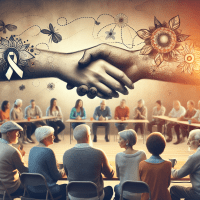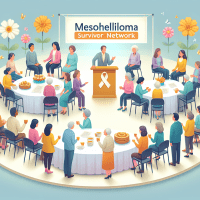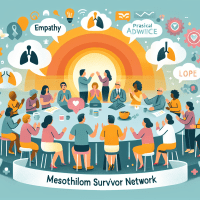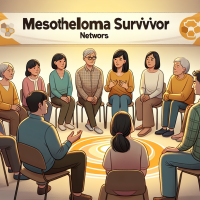Mesothelioma Survivor Network Events: A Beacon of Hope & Support
Hello, my name is Sarah, a registered oncology nurse with over a decade of experience in patient education and support. I understand the overwhelming mix of emotions that comes with a Mesothelioma diagnosis, and I want you to know that you are not alone. In this blog, I share a comprehensive guide on Mesothelioma Survivor Network Events that not only informs but also provides genuine, heartfelt support for your journey. Together, we will explore the latest in diagnosis, treatment options, emotional coping strategies, and community resources that can offer both solace and actionable insights.

Caption: A heartfelt community gathering symbolizing the power of connection.
Understanding Mesothelioma: Diagnosis and Staging
When I first encountered patients diagnosed with Mesothelioma, one of the most daunting aspects was understanding the diagnosis and the subsequent staging. Mesothelioma is primarily a cancer linked to asbestos exposure, attacking the protective lining of the lungs, abdomen, or heart. A prompt and accurate diagnosis is essential to manage treatment effectively. Diagnostic tests often involve imaging studies followed by biopsies such as thoracoscopy or thoracentesis, which help obtain tissue samples for analysis.
Types of Biopsies and What They Mean
Two common procedures include:
- Thoracoscopy: A minimally invasive procedure allowing direct examination of the pleura and collection of tissue samples.
- Thoracentesis: A procedure used to remove fluid from the space between the lungs and the chest wall, which also may provide clues to the presence of cancer cells.
Mesothelioma Staging
Mesothelioma staging typically ranges from Stage 1 to Stage 4. Here is a brief overview:
| Stage | Description |
|---|---|
| Stage 1 | The cancer is localized to one area, and treatment options are more extensive. |
| Stage 2 | The disease has begun to spread locally, necessitating careful treatment planning. |
| Stage 3 | Regional spread of cancer requires combined multi-modality treatments. |
| Stage 4 | Advanced spread with limited treatment options, focusing mainly on palliative care. |
Information on staging and treatment guidelines is current as of May 2025.
The Role of Survivor Network Events in Your Journey
Mesothelioma Survivor Network Events are not just gatherings; they are lifelines. They bring together individuals, families, and caregivers who share a common experience and provide mutual support. These events range from local support group meetings and awareness events to conferences that offer educational sessions with experts in the field.
Benefits of Attending Events
When you attend a Mesothelioma survivor event, you can:
- Connect with others who understand your journey.
- Learn from experts about the latest research and treatment options.
- Discover practical advice for managing symptoms, emotional health, and day-to-day challenges.
- Find inspiration in the shared stories of resilience and hope.
Personally, attending these events has provided me with much-needed emotional relief and practical tools to support my patients. The camaraderie, shared wisdom, and gentle guidance I experienced during such gatherings have been transformative.
Practical Tips for Making the Most of These Events
Based on my years working in oncology, here are some strategies for you if you’re considering attending a Mesothelioma survivor network event:
- Prepare Ahead: Write down your questions, concerns, and topics you wish to discuss with healthcare professionals.
- Bring a Support Person: Having a trusted friend or family member can offer both emotional support and help remember details later.
- Engage Actively: Participate in discussions and share your story if you feel comfortable. Your experience might provide hope to someone else.
- Network: Exchange contact information with peers; these connections often lead to long-term supportive relationships.
- Follow-Up: After the event, review any advice or information received and schedule time to discuss it further with your medical team.
Caption: Genuine connections made at a mesothelioma support event can be a source of strength.
Understanding Treatment Options Beyond Events
Mesothelioma treatment is complex and only one aspect of the broader picture of care. While network events provide community support, treatment typically involves a mix of surgery, chemotherapy, radiation therapy, and emerging immunotherapy or gene therapy options. Each treatment plan is as unique as the patient’s journey.
How Treatments Work
For example, surgery might be used to remove as much of the cancer as possible; chemotherapy uses drugs to target and kill cancer cells; and radiation therapy helps destroy cancer cells in specific areas. More innovative approaches, including immunotherapy, are being considered especially in cases where traditional methods have limited impact.
Emotional and Mental Health Support in the Journey
Beyond the physical aspects of treatment, the emotional toll of a Mesothelioma diagnosis is profound. I have witnessed firsthand the anxiety, fear, and isolation that can accompany such news. It is essential to address these emotions head-on with strategies designed to shape resilience and peace.
Strategies for Managing Anxiety, Fear, and Grief
Here are a few techniques that I always recommend:
- Mindfulness and Meditation: Daily practices can help center your thoughts and reduce anxiety. Even short sessions can make a significant difference in promoting mental clarity and calmness.
- Professional Counseling: Engaging with a therapist specialized in oncology can provide tailored strategies to cope with grief and anxiety. I have seen many patients benefit from such support.
- Support Groups: As emphasized earlier, community events can alleviate the isolation that sometimes accompanies this diagnosis. They provide a safe space to share feelings and learn coping strategies from those who have walked a similar path.
In my years as an oncology nurse, I have witnessed the incredible strength that comes from sharing and listening. In moments of profound despair, even a small word of encouragement has the power to light a spark of hope. Remember, every step you take is a testament to your resilience.
Clear Communication with Healthcare Providers and Loved Ones
Communicating effectively with your healthcare team and family is crucial. I encourage you to be proactive in discussing your treatment, concerns, and goals, and to ask for clarifications on any part of your care plan. Transparency and mutual respect in communication pave the way for better, more personalized care.
Tips for Open Communication
- Maintain a Health Journal: Record your symptoms, questions, and any side effects. This journal can be a crucial tool during appointments.
- Ask for Clarifications: Don’t hesitate to request detailed explanations about your treatment options or the results of your tests.
- Invite Loved Ones: Sometimes, having someone else absorb the details can help ensure that you don’t miss anything critical.
A Transparent Look at How This Resource is Supported
Before I conclude, I want to address an important note about transparency. My insights and support come from years of hands-on experience in oncology and a deep commitment to providing you with compassionate care. While there may be references to supportive services that include commercial offerings, rest assured that my primary goal is to empower you with reliable, heartfelt information and resources at no cost. This support is made possible by a combination of reputable funding sources and ethical partnerships that prioritize your wellbeing.
Your Next Steps: Embracing Community and Continuing the Journey
If you are facing Mesothelioma, please consider joining local support groups or attending Mesothelioma survivor network events. They offer not only the latest information on treatments but also the emotional support that is equally vital. I also encourage you to explore additional trustworthy resources such as the Understanding Mesothelioma Treatments article and the Emotional Support for Mesothelioma Patients guide available on our site.
Actionable Steps to Take Today
- Speak with your doctor or a specialist about treatment and support options.
- Reach out to local Mesothelioma support groups or check online for upcoming events in your area.
- Practice mindfulness or connect with a counselor to manage the emotional stress associated with the diagnosis.
- Keep a record of your medical journey to discuss during your appointments.
Remember, every challenge reveals an opportunity to grow stronger and more connected with those who truly understand your journey. I am here with you, every step of the way.
Facing Mesothelioma is daunting, but each day brings the possibility of new hope and improved care. May you find strength in community and comfort in the shared stories of resilience.
If you or a loved one has questions, please do not hesitate to reach out. This empathetic space is meant to support you with medical information, community resources, and compassionate guidance. I encourage you to always consult with your healthcare provider for personalized medical advice.
Note: All medical information provided here is for general informational purposes only and should not replace professional consultation.






